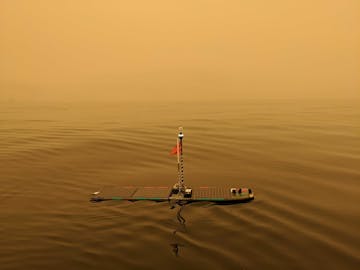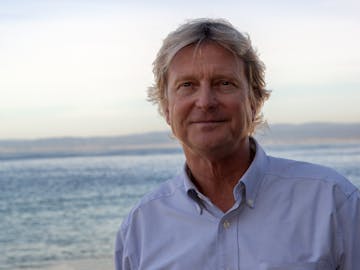It is often said that “necessity is the mother of invention,” but at the dawn of 2020, I had no idea just how much that phrase would apply to the coming months.
Fast forward to the end of 2020 when, during a presentation to all staff, I remarked that the previous months had been more than a decade in the making, which I am sure seems paradoxical. I was referring to the fact that we had been working to craft and refine a vision for MBARI’s future for many years to set the stage for the next generation of ocean scientists and engineers who will further MBARI’s mission. Major issues, such as replacing the Western Flyer (our flagship research vessel), building new shoreside facilities, and drafting a staff succession plan, are but a few of the elements of that emerging vision; 2020 was the timeframe we set to make key decisions on what direction MBARI would take in the years ahead. While the importance of this year was well known and long-anticipated from its outset, no one expected that it would unfold against the backdrop of a global pandemic.

Like all organizations, MBARI has contingency plans for meeting most imaginable challenges and emergencies, but we had no playbook for dealing with the emergence of COVID-19. Last March, in what seemed like the blink of an eye, MBARI’s buildings had to be quickly shuttered, all sea-going activities stopped, and the staff sent home under a state-mandated shelter-in-place order as we, like everyone, tried to understand what exactly we were up against and how long the disruption would last. Months later, as summer set in, we were finally able to partially reopen and resume some operations, albeit under unprecedented conditions. And then came social upheaval, which brought into focus the systemic racism that plagues our nation, and record-breaking destructive wildfires that threatened communities surrounding MBARI. “Apocalyptic” was the word most often invoked to capture the essence of that moment.

This Wave Glider floats on a calm Monterey Bay during the summer 2020 wildfires. Image: Chris Wahl © 2020 MBARI
Despite the gloom, despair, and angst that much of 2020 served, the challenges and setbacks also proved to be a surprising source of inspiration. As Wendy Schmidt, ocean champion and philanthropist, aptly remarked, “It morphed into an opportunity to make lemonade out of lemons.” We found new ways of continuing our work at MBARI and with our colleagues from around the world. Video conferencing replaced in-person meetings and school. Travel largely stopped, but national and international workshops and meetings continued virtually—ironically making it possible for more people from more institutions to participate than may have been possible if gatherings were held in person. The United Nations prepared to launch the Decade of Ocean Science. We reaffirmed our commitment to diversity, equity, and inclusion. Telepresence for reducing the number of people aboard ships became a new norm. And many of our long-term efforts to develop autonomous systems for observing the ocean proved their worth under circumstances we never imagined, giving us a tangible glimpse of the future.

This volume chronicles some of the achievements that we made during what was arguably one of the worst years in recent times. It reflects the resilience and resourcefulness of all of MBARI’s employees—an incredible team from all corners of the institute who pushed ahead despite the barriers—all of whom were enabled by the Packard Foundation and other sponsors who sustain MBARI. I am proud of what we accomplished and the vision we are advancing for the institute. We succeeded in breaking new ground despite all of the challenges faced on professional and personal fronts. Monterey Bay and its contiguous waters continue to offer an unparalleled natural laboratory for fostering marine scientific and engineering advancements with global-scale applications.
As we await the end of the COVID-19 pandemic and return to some semblance of normalcy, I am more than optimistic that 2021 will be a far better year than the one we leave behind—not only for MBARI, but for the entire world. As I have said time and time again, and as the following pages clearly show, the age of ocean exploration and discovery is very much alive. There is no doubt that we have much more to learn about our ocean—the treasures it holds, the natural hazards it poses, the role it plays in sustaining all life, and the importance and urgency of protecting it for future generations. There has never been a better time to look to the sea for inspiration and solace, as well as for educational and employment opportunities.
Please join us as we look forward to better times and write the next chapter in MBARI’s story. You can follow us by visiting our website and subscribing to our YouTube, Instagram, Twitter, and Facebook feeds. We love hearing from you and sharing our stories, and we are excited about the discoveries and adventures that lie ahead. See you on the water!


